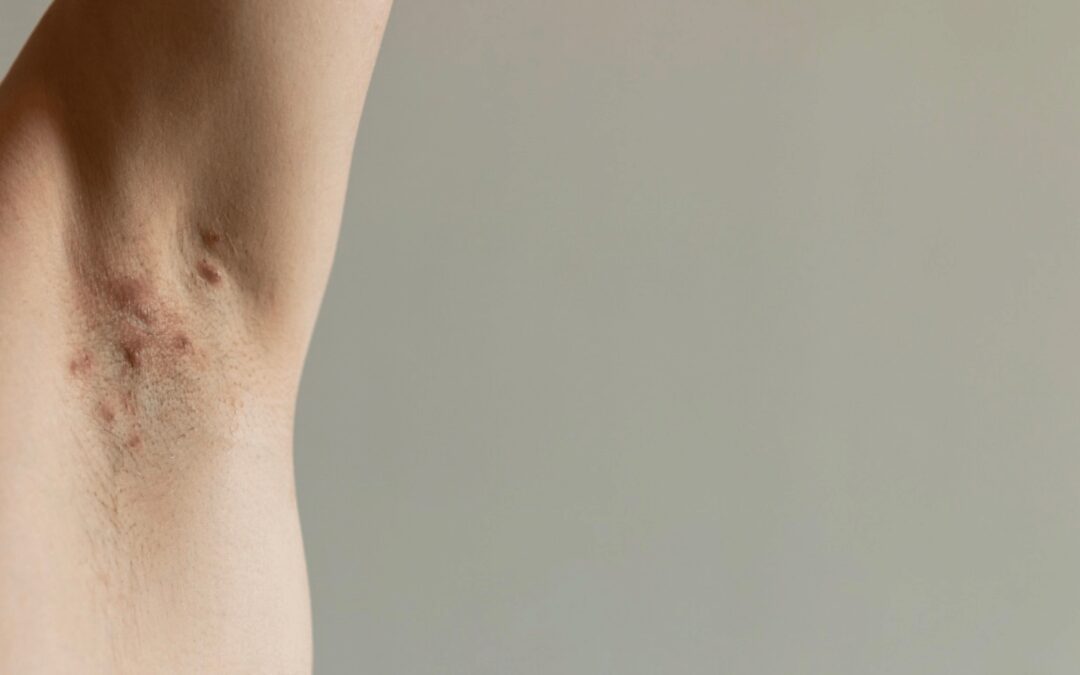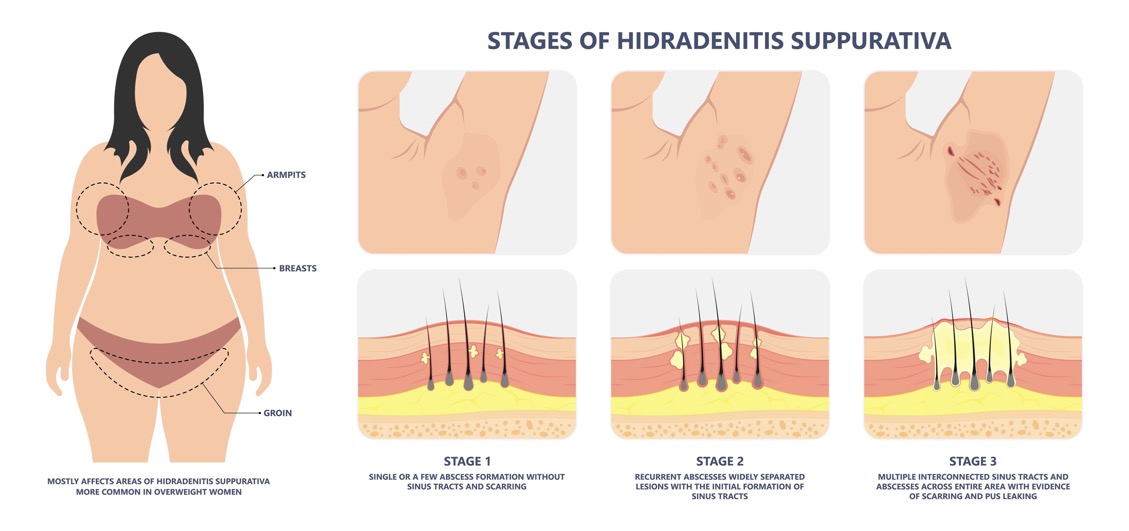Can natural treatments help heal hidradenitis suppurativa?
Of the many skin conditions I support as a Naturopath, hidradenitis suppurativa (or acne inversa) would be the one my clients find to have the most destructive impact on their quality of life. Depression, embarrassment, and social stigma are common with this condition.
Hidradenitis suppurativa is often described as a treatment challenge, but I have found that a holistic approach targeting the underlying causes supports long-term remission or healing for many patients.
What is hidradenitis suppurativa?
Hidradenitis suppurativa is a chronic, inflammatory condition of the hair follicles which can persist for decades, often with a relapsing-remitting pattern.
The painful, deep-seated lesions arise in areas where there are sweat glands – armpits, groin and anogenital region. Single or multiple isolated lesions may last for 7-10 days, rupture and drain a foul-smelling discharge. These dermal abscesses can scar the skin and subcutaneous tissues.
Hidradenitis suppurativa is not caused by poor hygiene and is not contagious.
Who gets it?
Hidradenitis suppurativa may affect 1-4% of the population, but it is often underdiagnosed or misdiagnosed. Women are four times more likely to have it compared to men. Hidradenitis suppurativa usually presents after puberty and can regress after menopause.
Risk factors
Genetics are a strong risk factor, with estimates that 30-40% of people with hidradenitis suppurativa have a relative who has it. Obesity and tobacco smoking are two other substantial risk factors.
Symptoms
The first stages of hidradenitis suppurativa can appear like a large, isolated cystic pimple in the armpit, groin or anogenital region. The lesions feel hot, aching, tender, itchy and sore.
As hidradenitis suppurativa progresses, you can get multiple cysts that leak a foul-smelling discharge. At this stage, they can be colonised with other bacteria resulting in a secondary bacterial infection.
Symptoms can flare around the menstrual cycle.
Co-morbidities
Hidradenitis suppurativa often presents with other conditions, which may include
- Obesity (70%)
- Metabolic syndrome (fatty liver, high triglycerides, raised insulin)
- Systemic amyloidosis
- Arthritis – in 28%
- Inflammatory bowel disease – 4-8 times more likely
- Psoriasis
- Depression
- Polycystic ovarian syndrome (PCOS)
- Non-alcoholic fatty liver disease (NAFLD)
What else could it be?
- Carbuncle (boil), furuncle
- Epidermoid or dermoid cyst
- Erysipelas
- Granuloma inguinal
- Tuberculosis
- Pilonidal cyst
- Crohn’s disease
What causes Hidradenitis suppurativa?
The underlying cause of hidradenitis suppurativa has not been proven. Obesity and tobacco smoking are the two most significant risk factors for this condition, so that it would seem like systemic inflammation is a prime suspect. Research has revealed links to immune dysregulation with a potential autoimmune component. There are also investigations into the role of the skin and gut microbiome and endocrine/metabolic abnormalities.
I suspect there isn’t one single cause for hidradenitis suppurativa, but rather it arises when several triggers are present.
Medical treatment
Standard medical approaches consist of using a variety of drugs depending on the severity to manage the symptoms. These include anti-androgens, combined oral contraceptives, retinoids and corticosteroids. The effectiveness of these is variable.
Antibiotics are often used in more severe cases to manage secondary bacterial infections. Mild to moderate lesions can be treated with electro/cryosurgery and punch debridement. Surgical incision and drainage are used for those with chronic sinus tracts and scarring. However, this only deals with existing lesions and doesn’t prevent new lesions from forming.
Clinical trials are currently underway using various immune-modulating drugs, with some promising results emerging.
Natural treatment approaches for hidradenitis suppurativa
As holistic and functional health care, Naturopathy is ideally placed to support remission in those with hidradenitis suppurativa. The clinical approach I use targets multiple underlying drivers to bring the body back into balance.
This approach can work in with standard medical treatments. Naturopathic treatments will not resolve tunnels, fissures or scarring, and antibiotics should always be considered in the case of secondary bacterial infections.
I do recommend working with an experienced practitioner. This will avoid a scattergun approach and wasting money on a cupboard full of ineffective supplements.
Naturopathic treatment aims in hidradenitis suppurativa
- Support resolution of existing lesions and reduce the need for antibiotics
- Reduce systemic inflammation
- Improve immune function
- Support optimal metabolic and hormonal health
- Optimise the skin and gut microbiome
- Support other lifestyle changes: stress management, mental health, smoking cessation and sleep.
Lifestyle recommendations
- Limit irritation to the area. Avoid tight synthetic clothing and hair removal.
- Reduce visceral fat mass to decrease skinfold friction
- Quit smoking. Smoking negatively impacts both the lung and skin microbiome and contributes to systemic inflammation
- Limit the use of non-steroidal anti-inflammatory drugs (NSAIDs). NSAIDs decrease immunity and have been associated with infection onset.
- Stress management – Stress is associated with hidradenitis suppurativa flares.
- Adequate sleep (at least 7 hours a night) is essential for metabolic and immune health.
- Address periodontal disease. The mouth microbiome interacts with the skin microbiome. Periodontal disease also causes a chronic, low-grade inflammatory response.
- Support mental health
Diet
Diet and nutrition are the foundation of a successful treatment plan for hidradenitis suppurativa. A nourishing diet can go a long way to addressing nearly all the underlying drivers of this condition. What you eat dramatically impacts systemic inflammation, skin and gut microbiome, immune function, and metabolic health.
In constructing a diet for my hidradenitis suppurativa patients, I follow these principles
- Nutrient-dense whole foods with 7 serves of vegetables per day to ensure adequate fibre to feed the microbiome. This helps reduce inflammation and support immune function. The Mediterranean diet is a well-known example of this.
- Low glycaemic load to support metabolic health and avoid insulin spikes. Cut out/limit refined sugar, simple carbohydrates, and alcohol.
- Limit industrial processed vegetable oils (like canola and sunflower oil) and boost omega-3 fats from oily fish, leafy green vegetables, chia and hemp seeds.
- Small amounts of high-quality dairy and meat (if eaten). Avoid high levels of branched-chain amino acids (BCAA) found in meat and dairy. These activate metabolic signalling pathways like mTOR, which increase the risk of flares.
- Some people have found a yeast-free diet.
Digestive Health
Another factor that goes hand in hand with the diet is digestion. The ideal diet won’t give you the full benefits if you can’t digest and absorb the nutrients and eliminate the waste. Supporting digestive health includes looking at stomach acid, digestive enzyme release, liver function, microbiome health and bowel function. This will be particularly important if you also have inflammatory bowel disease.
Nutritional supplements
There is a lack of scientific studies on the benefits of nutrients or herbs in hidradenitis suppurativa. The following is based on my clinical experience.
Before supplementing with specific nutrients, I advise getting assessed or tested. Clinically I use a range of nutritional support tailored to my client’s unique needs. Some may need more immune support nutrients some may need more immune help. No one size fits all.
Some nutrients I often use include
Zinc
Zinc targets many of the underlying drivers of hidradenitis suppurativa. Adequate zinc supports healthy innate immune function. It is essential for wound healing and collagen formation. Zinc is also an anti-androgen and is required for insulin.
A study using 90mg/day of zinc gluconate for three months showed a reduction in the number of lesions and duration of flares. The benefits continued even after treatment stopped.
High-dose zinc supplementation for longer than three months can interfere with copper and iron utilisation. After an initial period at a higher dose, I would recommend going to a maintenance dose of < 20mg (elemental) zinc per day.
Vitamin D
A 2022 study showed that up to 77% of people with hidradenitis suppurativa had Vitamin D deficiency or insufficiency. Vitamin D is essential for skin barrier function and immune regulation.
Inositol
Inositol can be a helpful addition to hidradenitis suppurativa treatment in those with PCOS or other metabolic dysregulation, as it helps improve the action of insulin and lower androgens. It also enhances zinc absorption and can help modulate the stress response by lowering cortisol. Although doses of anywhere up to 10 grams a day are recommended, I find 600-1000 mg are effective and avoids the gastrointestinal side effects of higher doses.
Herbal medicines
This is where treatment gets very personalised. Herbs are not like pharmaceutical drugs, where this herb works for that condition. Certain herbs work better with underlying constitutions better than others. For example, Turmeric is well known for its anti-inflammatory benefits, but it’s also very warming, so for a woman with hot flushes having high doses of curcumin is not going to be pleasant.
I recommend working with an experienced herbalist who can craft a formula that supports your presentation. They will also be able to check that nothing will interact with any other medications you might be taking.
Herbs can help support the actual hidradenitis suppurativa or other contributing factors such as smoking cessation, sleep, or stress management. Herbs can be used either topically – such as in a poultice to support the healing of lesions or internally to address systemic drivers.
Some categories of herbs I would consider include
Anti-inflammatory
Turmeric, Pomegranate, Japanese Knotweed
Immune supporting
Cat’s claw, Echinacea, Rehmannia, Nigella
Blood sugar regulating
Cinnamon, Gymnema, Fenugreek, Holy basil,
Anti-androgen
Peony + liquorice, Spearmint, Reishi
Detoxification
Oregon grape root, Burdock, Cleavers, Echinacea
Remission of hidradenitis is possible
There are no “quick -fix” natural treatments for hidradenitis suppurativa. The best results come from building a solid and consistent foundation of healthy diet and lifestyle habits. Herbs and supplements can help in the short to medium term to correct underlying imbalances. Everyone’s treatment timeline is a little different depending on severity. It requires persistence and patience, but it is possible to achieve remission.
If you have hidradenitis suppurativa, I hope this has given you some insights and hope.
(References available on request)
If you enjoyed this article, you might also like –

Need help with your skin?
Norelle Hentschel is an experienced Naturopath with a clinic in Stones Corner, South East Brisbane and also offers Telehealth consults Australia-wide. She supports the resolution of chronic skin conditions with diet, lifestyle, nutrition and herbal medicine.


